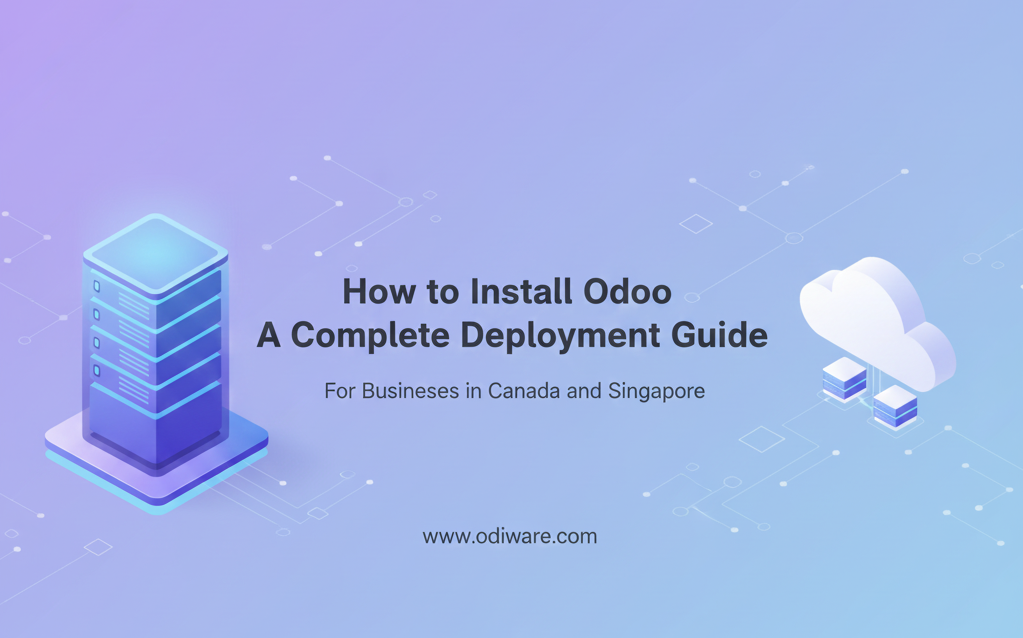Odoo has become a preferred ERP solution for businesses across the world because of its flexibility, modular structure, and ability to centralize all business operations including CRM, Accounting, HRM, Supply Chain, Project Management, POS, Inventory, and eCommerce. As organizations continue modernizing operations, Odoo proves to be a powerful foundation for digital transformation.
The first step to unlocking its potential begins with installing and deploying Odoo in a stable and optimized environment. This guide explains the standard and recommended approach for installing Odoo on both local machines and production servers. It has been specifically designed to support organizations located in Canada and Singapore where seamless performance, data security, and scalability are essential.
For an extended step by step version with screenshots and structured documentation, you can refer to our detailed guide here:
https://www.odiware.com/odoo/how-to-install-odoo-on-your-server-or-local-machine/
This blog provides a practical, professionally oriented variation that helps decision makers understand the installation process and encourages a smooth deployment journey.
Why a Proper Odoo Installation Approach is Critical
Installing Odoo is not only about running scripts or selecting an installation package. A well planned deployment ensures:
High performance and multi user efficiency
Stable environment for custom modules and API integrations
Secure configuration suitable for enterprise environments
Future upgrade capability without conflict issues
Smooth handling of backups, staging and production transitions
Many organizations face challenges when Odoo is installed without proper technical planning. These challenges include database performance issues, dependency failures, PDF reporting errors, slow response time, or system crashes after scaling users or modules.
To avoid these risks, an installation must follow recommended technical standards and structured deployment.
Installing Odoo on Linux Ubuntu Recommended for Production Usage
Odoo runs most efficiently on a Linux based operating system. Ubuntu 20.04 or 22.04 LTS is considered the most stable environment for production deployment.
Step 1 Update The System
sudo apt update && sudo apt upgrade -y
Step 2 Install Dependencies and Libraries
sudo apt install git python3 python3-pip python3-dev build-essential \
libxslt-dev libzip-dev libldap2-dev libsasl2-dev libpq-dev -y
Step 3 Install PostgreSQL Database
sudo apt install postgresql -y
sudo -u postgres createuser –createdb odoo
Step 4 Download Odoo Source Code
sudo git clone https:www.github.comodooodoo –depth 1 –branch 17.0 optodoo
Step 5 Configure Virtual Environment
cd optodoo
python3 -m venv venv
source venvbinactivate
pip3 install -r requirements.txt
Step 6 Run Odoo
.odoobin -d odoo17 –addons-path=addons
Access the Odoo dashboard using browser
http:yourserverIP8069
Installing Odoo on Windows For Development or Testing
Odoo can be installed on Windows for learning or demo purposes. It is not recommended for high volume production use.
Step 1 Download the official Odoo Windows installer
https:www.odoo.com/pagedownload
Step 2 Run installation wizard, configure PostgreSQL, set master password
Step 3 Access the instance through the browser:
http:localhost8069web
Deploying Odoo on Cloud Servers
For growing businesses and multi user environments, cloud hosting offers global access and greater stability. The most frequently used hosting platforms for Odoo include DigitalOcean, AWS EC2, Google Cloud, and Odoo.sh.
A cloud production deployment typically includes components such as NGINX reverse proxy, SSL configuration, PostgreSQL tuning, automated backup scheduling, background worker optimization, and email SMTP configuration.
Organizations in Canada and Singapore often prefer cloud deployment due to distributed workforce and real time collaboration requirements.
Customizing Odoo After Installation
Once Odoo is successfully installed, the next stage is workflow configuration and customization to meet real business requirements. Companies typically require custom UI modifications, automation logic, process maps, additional reports, connector development and ERP integration with third party applications like Shopify, QuickBooks, Amazon, or CRM systems.
For business specific customization support
Canada httpswww.odiware.com/odoo-customization-canada
Singapore httpswww.odiware.com/odoo-customization-singapore
Odoo Implementation and Consulting Support
Correct installation is only the starting point. Real transformation requires strategic planning, implementation, training, and continuous support. Odiware provides experienced Odoo specialists supporting businesses across Canada and Singapore with complete ERP enablement at predictable cost and timelines.
For full implementation services
Canada https:www.odiware.com/odoo-implementation-canada
Singapore https:www.odiware.com/odoo-implementation-singapore
For consulting and technical guidance
Canada https:www.odiware.com/odoo-consulting-canada
Singapore https:www.odiware.com/odoo-consulting-singapore
Why Businesses Prefer Odiware as Their Odoo Partner
Odiware supports organizations from installation to long term operational success. Our focus is on reliability, performance, and measurable business outcomes. With certified Odoo professionals, strong development capability, and deep experience delivering industry specific solutions, Odiware ensures stable, tailored, future ready ERP environments.
Our services include
Odoo installation and managed deployment
Implementation and business workflow setup
Advanced module development and integrations
System migration and version upgrade
Support and maintenance
Learn more about us at
https:www.odiware.com
Conclusion
Installing Odoo is a crucial foundation step for building a unified and intelligent business management system. Whether installed on a local environment for testing or deployed on a high performance production server, the process must follow technical best practices to achieve speed, scalability, and reliability.
For businesses in Canada and Singapore seeking professional assistance with installation, customization, or implementation, Odiware offers expert support designed to improve performance and accelerate go live.



